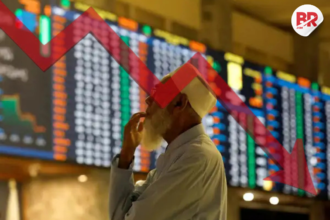
Global Market Selloff Deepens Amid U.S.-China Trade War Tensions
The global market selloff intensified this week as fresh U.S.-China tariff hikes spooked investors. Stocks tumbled, the dollar weakened, and bond yields surged—marking one of the most volatile periods in recent years.
Market Chaos Fueled by Trade War Escalation
Financial markets worldwide took a hit as the U.S. ramped up tariffs on Chinese imports. The effective rate jumped to 145%, up from 104%, while China responded with 84% tariffs of its own. Despite a temporary tariff pause by former President Trump, markets remained jittery, bracing for more disruptions in global trade.

Investors responded with caution. The U.S. 10-year Treasury yield rose sharply to 4.45%, its biggest weekly gain since 2001. Meanwhile, 30-year Treasury yields climbed to 4.90%, a rise not seen since 1982. This sharp selloff in bonds reflects deep concerns about U.S. fiscal sustainability, not just inflation.
Safe-Haven Assets See a Surge
As the global market selloff gathered pace, investors rushed to traditional safe-haven assets. Gold prices soared to an all-time high of $3,210 per ounce, signaling a flight to security.
Currencies like the Swiss franc hit a 10-year high against the U.S. dollar, while the Japanese yen and the euro also strengthened. These moves underscore growing doubts about the dollar’s stability amid trade turmoil.
Dollar Drops to Historic Low
The dollar index slipped below 100, touching its lowest level since July 2023. This sharp drop provided temporary relief to emerging market currencies. For instance, the Malaysian ringgit rebounded, reflecting improved investor sentiment toward non-dollar assets.
“The global market selloff is not just about tariffs. It reflects deeper fears about long-term economic stability.”
Also Read: Gold Price Record High as Tariffs Hit 145% — Is the World Seeking Refuge from a Financial Storm?
Asia-Pacific Markets React Differently
The trade war’s impact was uneven across the Asia-Pacific.
- Japan’s Nikkei plunged 4.3%, making it the worst performer in the region.
- South Korea’s KOSPI index slid 1%.
- Taiwan’s TWII index, however, recovered strongly, ending the week up by 2%.
- China’s CSI300 closed flat, while Hong Kong’s HSI edged up by 0.56%.
These mixed reactions highlight the complexity of regional exposure to U.S.-China tensions.
Commodities and Oil Decline
Oil prices also took a hit from fears of slowing global demand. Brent crude slipped by 0.6%, extending its losing streak to a second straight week. The ongoing trade war has raised concerns about industrial output, which typically drives oil consumption.
What This Means Going Forward
The global market selloff is a stark reminder of how fragile financial systems can be in the face of geopolitical strife. With trade tensions rising, investor sentiment is likely to remain shaky.
Markets now await signals from central banks and policymakers. Will there be interventions to stabilize the dollar and bond markets? Or will volatility continue to dominate headlines?
Also Read: Trump Tariff Policy Could Ground $40M Jets, Disrupt U.S. Airline Deals












